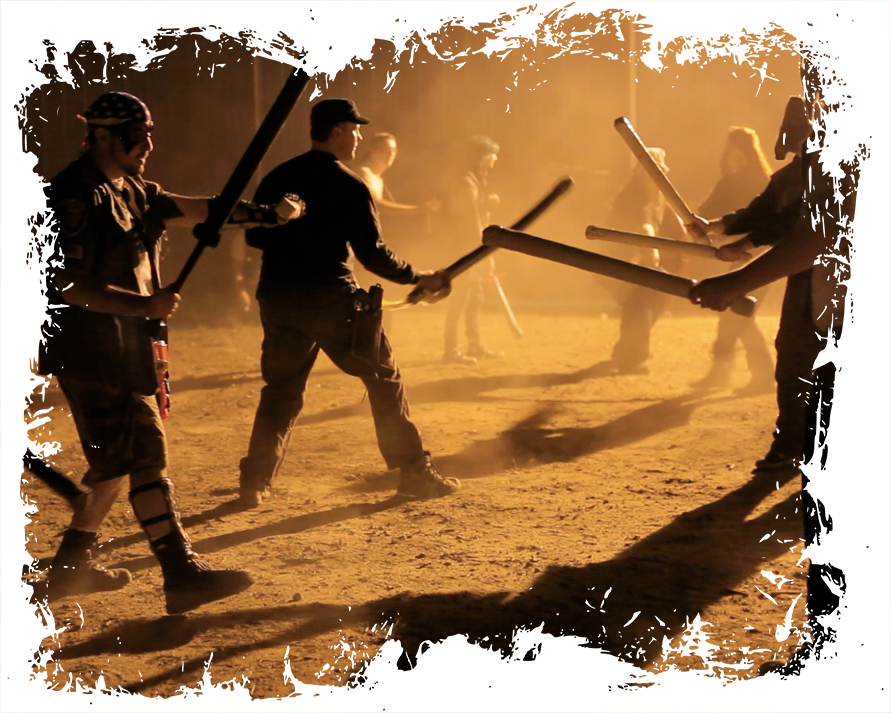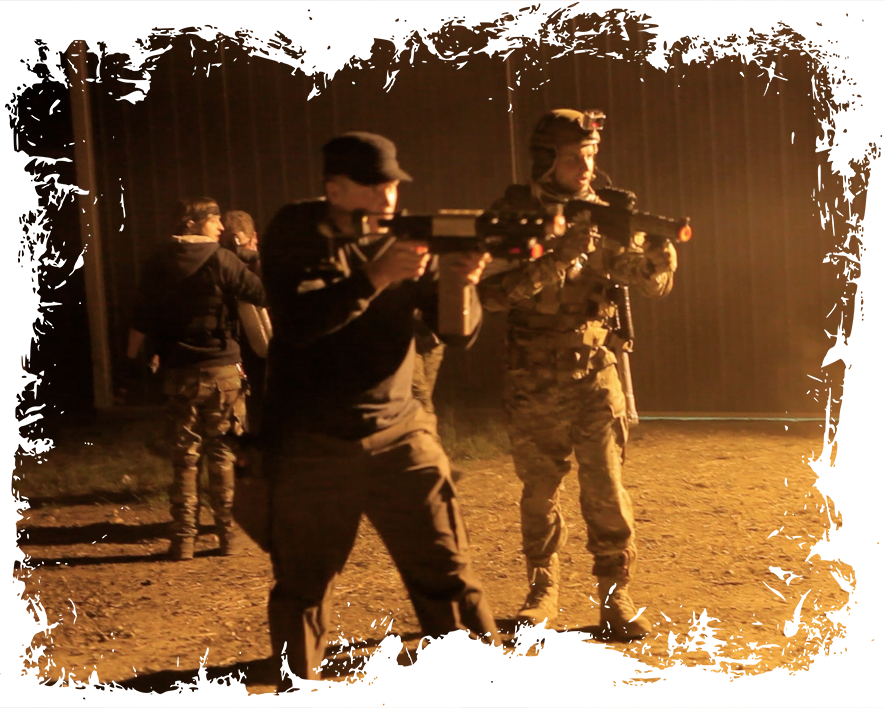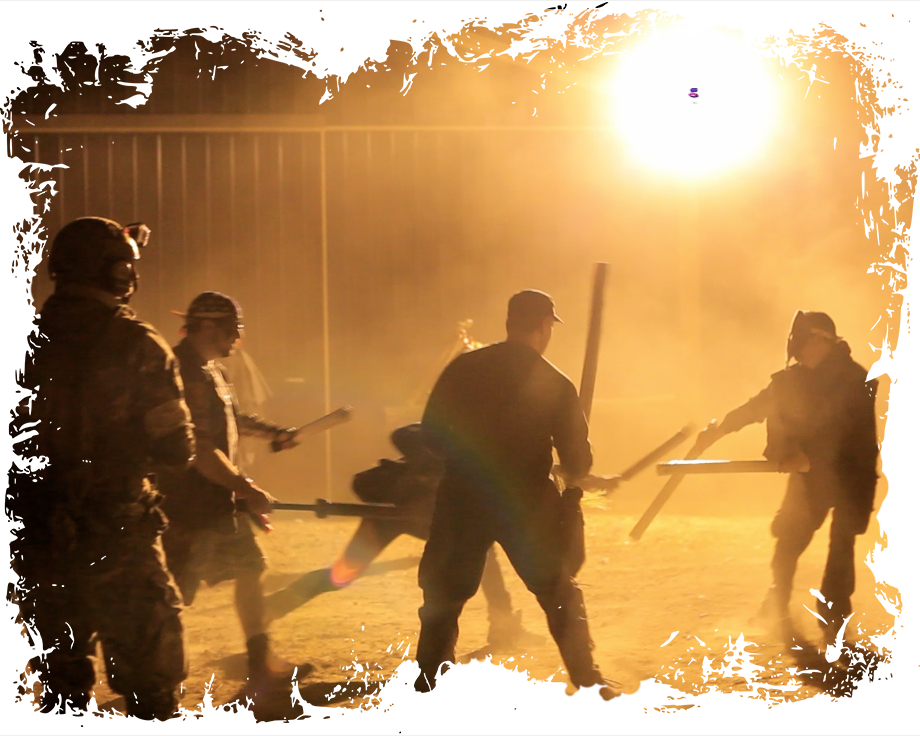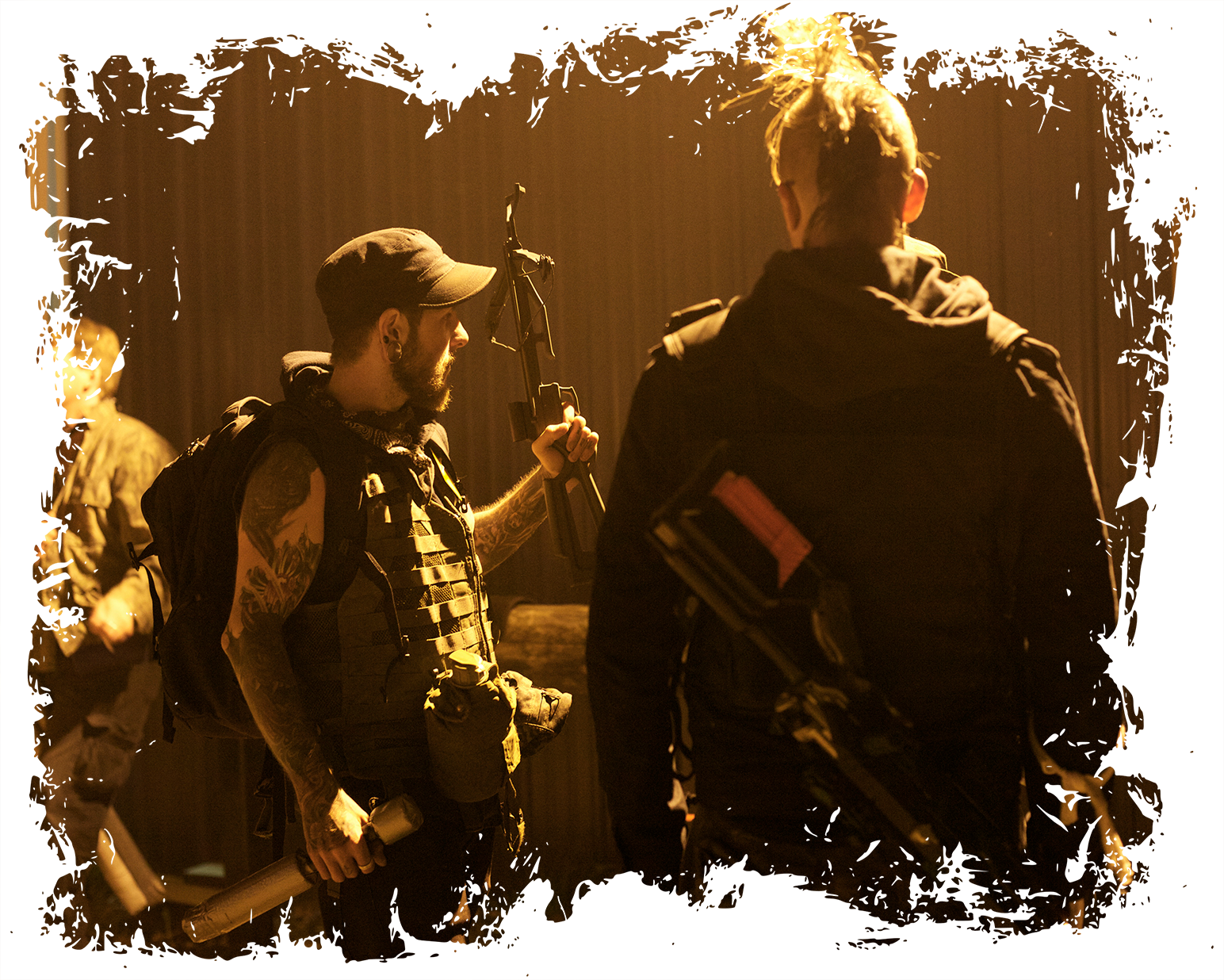Theatric Touch Combat
DOOMFELL uses a unique theatric touch-style of fighting that is both exciting, realistic, and safe when all participants follow the rules.
Players roleplay making attacks with contact-safe melee and ranged weapons. A player who has been hit with an attack must stop, step backwards and roleplay a reaction to the contact before he may make a counterattack.
All melee and ranged weapons must pass a safety inspection. The head, groin and female breasts are illegal targets. The hands are not legal targets. If an opponent does not respond theatrically to an attack, then their subsequent hits can be discounted by their target until a proper roleplayed reaction occurs.
Administrators reserve the right to deny use of any weapon they feel is unsafe. Combat safety is the responsibility of every individual player.
Uncontrolled running or sprinting is not allowed. No pushing, shoving or other physical contact is permitted. Participants running at someone must stop before entering melee combat range.
Dragging is an attempt to move a non-resisting (willing, incapacitated or dead) character to a new location. To perform a drag, the character intending to drag must gently place an open hand (never grab because you can tear costumes) on the target character’s shoulder and state “dragging”. The dragged character follows the dragging character for as long as the dragger maintains an open hand on the target.

Melee Combat
Melee weapon facsimiles are safe-contact weapons made from pliable foam over a rigid core. To attack, participants place their facsimile weapon on the target character’s body with minimal force and acceptable speed. Hard hitting, rapid striking, and body-to-body physical contact are prohibited. Melee weapons are manipulated with the wrist and forearms, without the use of shoulder and back muscles. Strikes that make solid touch contact with a targeted character’s body cause one damage. The attacker does not announce damage. The target reacts to damage by roleplaying.

Ranged Combat
Projectile weapons are represented by unmodified safe-shot that launch foam darts. Thrown weapons (such as knives and axes) are represented by pliable foam facsimiles. Use of ranged weapons require an aiming count before shooting or throwing. Participants count “aiming 1, aiming 2, aiming 3.” After completing the count and the attacker shoots the safe-shot weapon or throws the facsimile at the target. If the attack hits the target, the attacker will state the damage and any effect. The target reacts to damage by roleplaying.

Skill Effects
The rules use “keywords” to describe how you should react during play. Every skill is assigned a name and a keyword effect. Players speak the skill name as they use the skill and say the effect when the skill is successful. The skill name and effect relate to each other, reinforcing the meaning of each. The following keywords are the most common effects encountered during play. Player should be familiar with these in order to play the game effectively.
Crit [number]
Crit, short for critical, represents a powerful hit on a target that causes increased damage. Example “Crit 3”.
Die
Die causes the character to immediately drop to the ground and roleplay being dead. They gain the dead condition and lose the alive condition (see Life and Death section). A type of die effect is the “Die in [duration]” which causes death to occur at the end of the stated time. Examples: “Die” or “Die in 3 minutes”.
Disable
Disable prevents the use of the stated body part for stated duration. The body part cannot be used, except as described in the Life and Death section. Examples: “Disable brain, 1 minute”, “Disable leg, 1 minute”, “Disable arm, 1 minute”, “Disable spine, 1 minute”, “Disable vision, 1 minute”, and “Disable vocals, 1 minute”.
End
End causes the duration of the stated effect or condition currently affecting the character to immediately stop. Examples: “End [castings]”, “End obey and serve”, “End unconscious”.
Fix
Fix restores the damaged structure of an item. Most time instantly fixing something causes [cost] fatigue, while fixing something more slowly just takes time. Examples: “Fix [cost]”, “Fix 1 damage after [amount] seconds”.
Flee
Flee causes the target to move the stated distance in feet away from the source at their fastest move rate. Players just roleplay jogging or long-stepping away. At no point may the target move toward the source. Characters cannot affect themselves with this effect. Examples: “Flee 40”, Flee 60”.
Fling
Fling lifts the target in a horizontal plane forcing them away from the source for stated distance in feet. Players just roleplay flying through the air as they jog or long-step away. The path of travel is a straight line vector away from the source in the direction that creates the greatest distance from the source at the end point with the smallest detours around obstacles. Characters cannot affect themselves with this effect. Examples: “Fling 40”, “Fling 60”.
Gain
Gain causes the target to gain a skill or trait. Gain does not fix broken structure or heal damaged health. Examples: “Gain adhesion”, “Gain [trait]”, “Gain [listed knowledge]”.
Incapacitate
An incapacitated character will immediately drop to the ground. The character may move slowly and speak in whispers, but may not use skills nor perform any other activity with in-play effect.
Injure
Injuries prevent the use of the stated body part until the injury is healed. The body part cannot be used, except as described in the Life and Death section. An injury to the character vitals causes the character to immediately drop to the ground and roleplay being dead. They gain the dead condition and lose the alive condition (see Life and Death section). Examples: “Injure brain,” “Injure leg” “Injure arm”, “Injure spine”, “Injure vision”, “Injure vocals”, and “Injure vitals”
Manipulate
Manipulations are mental effects that cause a target to act in a certain manner. They only work on characters (most non-beast characters) with intelligence II or greater. Example: “Manipulate: have disposition to help, 1 hour”, “Manipulate: give away money, 1 hour”, “Manipulate: speak only truth, 1 hour”, “Manipulate: compelled to kill, 1 hour”.
No
No indicates that the target is unable to do, use, or perform the stated activity. The “no” effect always has a duration. Examples: “No adhesion, 15 minutes” “No attacks, 10 second”, “No attacks, 20 second”, “No casting, 30 seconds”, “No ranged feats, 3 minutes”.
Obey and Serve
Obey and serve causes the character to behave in the best interests of the caster by fulfilling all instructions to the best of their ability, eagerly volunteering information and services, and acting at all times to prevent the removal of this effect. Examples: “Obey and serve, 5 minutes”.
Restore
Restore allows a character to remove damage from Health and hide, to heal injuries, and to remove the dead condition. Most time instantly healing something causes [cost] fatigue, while healing something more slowly just takes time. Examples: “Restore Health”, “Restore [injury]”.
Restrain
Restrain denies a character the use of some part of their physical form for a stated duration. The individual rules for ropes, locks, restraining devices, castings, and traps explain how characters can be freed from each type of restraint. “Restrain body, 30 seconds”, “Restrain arms, 20 seconds”, “Restrain legs, 20 seconds”, “Restrain vocals, 20 second”.
Surprise
Surprise is used to inform players that the skill effect cannot be countered by a response if the character is “surprised” as described under surprise feats.
Unconscious
Unconscious causes the target to drop to the ground and roleplay being dead. They gain the unconscious condition and are unable to move or perceive the environment.
